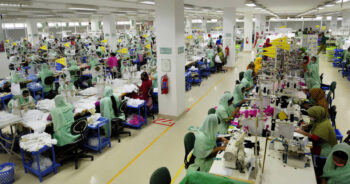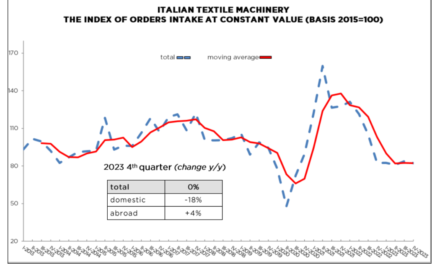 Bangladesh has registered a 10 percent surge in its exports of readymade garments (RMG) in the fiscal year 2022-23, defying the adversities inflicted by the Russia-Ukraine war and subsequent inflation.
Bangladesh has registered a 10 percent surge in its exports of readymade garments (RMG) in the fiscal year 2022-23, defying the adversities inflicted by the Russia-Ukraine war and subsequent inflation.
The export growth rate was 5.64 percent in the first six months of the current year, when the import of cotton, a key raw material for garment production, plummeted by 29 percent.
A total of 632,000 tonnes of cotton valued at Tk 170 bn were imported during the January-June period this year, against 891,000 tonnes imported in the previous year’s corresponding timeframe.
However, the cotton imports reached 1800,000 tonnes, valued at Tk 470 bn, at the end of the previous year.
Some textile sector entrepreneurs said there was a significant decline in foreign purchase order in the previous year’s second half, which impacted the textile sector. Adding more to the woe, a shortage in gas supply hit the production activities hard and factories struggled to supply the products in time. On the flip side, there was a huge import of cotton in the previous year.
Hence, a good number of spinning mills did not dare to import a good amount of cotton in the year, against the backdrop of gas outage, dollar crisis, and low purchase order. However, the entrepreneurs feared that a sudden upswing in purchase orders for RMG products may result in a shortage of yarn. The traders are facing hassles to open letter of credit (LC) to import cotton, while the following process of import takes up to two months to be completed.
The spinning mills produce yarn from the imported cotton, which is then used for crafting garments.
According to Bangladesh Textile Mills Association (BTMA), the local spinning mills meet around 80 per cent demand of the yarn for the export-oriented knitwear factories. The figure stands at 35 to 40 percent for woven garment factories. There are 510 spinning mills across the country, with a total production capacity of 3.8 bn kilograms per year.
The cotton import did not slow down even during the pandemic. The country imported 1.554 mn tonnes of cotton in 2019 and the volume rose by 3,000 tonnes in the following year. The figure rose to 1.979 mn tonnes in 2021 and later dropped to 1.8 mn tonnes in 2022. A substantial 43 percent of the cotton is imported from Africa, while India accounts for 20 percent of the imports. Of the 8.1 mn bales of cotton imported last year, 3.5 mn bales came from Africa, 1.6 mn bales from India, 1.3 mn bales from Brazil, and 1.15 mn bales from Benin.
Khorshed Alam, Chairman of Little Group of Companies, said the spinning mills could not utilise two-thirds of their production capacity due to low gas supply, leading to cotton stockpiling. There will be a cotton stock of around six months if the mills operate at half capacity, while full capacity operation will deplete the stock within three months.
Responding to a query, Khorshed Alam said they have geared up the search for new purchase orders in comparison to the previous month, while the sale of stocked yarn has also risen. It indicates that there will be no problem in cotton imports if the purchase orders increase in the coming days.
Meanwhile, the yarn imports have also dwindled by 36 percent in the first half of the current year. According to the BTMA, a total of 413,000 tonnes of yarn were imported during the January-june period this year, marking a decrease of 235,000 tonnes compared to the same period the previous year.
BTMA President Mohammad Ali said the textile factories started gearing up their production, but there is no sign of respite from gas and power crises. The adversities now restrict most factories to operate at only 40 to 50 percent of their production capacity.
At the same time, the persistent dollar crisis and the reduction of the Export Development Fund (EDF) by Bangladesh Bank have caused delays in opening LCs for cotton imports, he added.
The BTMA President also warned that an abrupt surge in purchase orders for ready-made garments may lead to supply issues for both cotton and yarn.


















